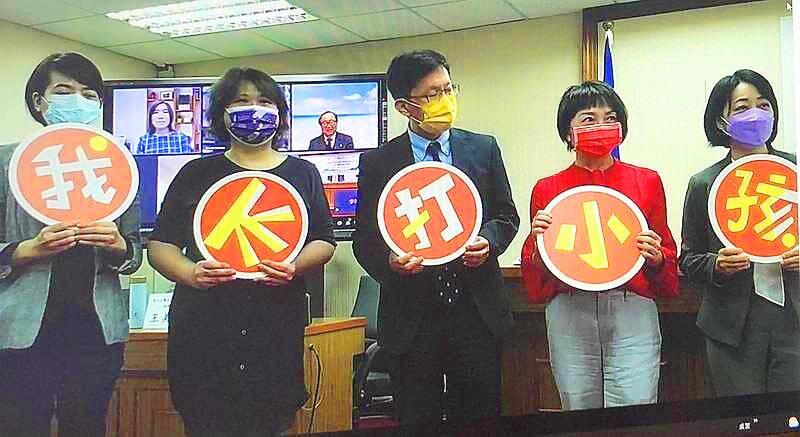The Ministry of Justice (MOJ) yesterday defended a proposed amendment to child protection laws following criticism that it did not clearly define child abuse or provide supporting measures for its implementation.
The ministry on Tuesday last week posted public notice of the draft amendment to Article 1085 of the Civil Code, which stipulates that “parents may, within the limit of necessity, inflict punishment upon their children.”
The proposed amendment would remove that phrase and substitute it with a ban on any form of parental discipline that inflicts “physical or mental violence,” which could result in a loss of custody for the offending parents or guardian.

Photo courtesy of the Humanistic Education Foundation
The reason for making the change is to align domestic law with the UN Convention on the Rights of the Child (UNCRC), which protects children from “all forms of physical or mental violence, injury or abuse,” the ministry said in the public notice.
Deputy Minister of Justice Chen Ming-tang (陳明堂) yesterday told reporters that in the judiciary’s experience “inflicting punishment” is inappropriately phrased language.
The bill’s purpose is to delete the reference to punishment and rectify the article by specifically protecting children against physical and mental violence, he said, adding that the ministry appreciates receiving responses from the public about the proposal.
Draft bills are published to invite public debate, and the version of the amendment posted in the notice is not final, another ministry official said.
The bill’s ban on physical violence applies to corporal punishment and other cruel or debasing punishments, while the ban on mental violence applies to neglect and psychological, emotional or verbal abuse, the official said.
The proposed changes are made according to the UNCRC’s general comments No. 8 and No. 18, and the National Human Rights Commission’s recommendation that laws against corporal punishment are urgently needed, they said.
A more specific definition for what comprises physical or mental violence would be provided after the bill’s consultative and review period, the official added.
Health Promotion Administration Protective Services Department Director-General Chang Hsiu-yuan (張秀鴛) said that the proposed amendment would target chronic, sustained and harmful use of corporal punishment and not occasional spanking by parents.
Corporal punishment can reinforce negative behavior in children, she said, adding that slapping a child might teach them to use violence to silence another person.
Earlier in the day, Humanistic Education Foundation executive director Joanna Feng (馮喬蘭) said that abolishing the right to inflict punishment is an important step toward ending corporal punishment.
However, realizing the aims of the law would require the government to implement supporting measures such as giving parents the resources and knowledge they need to raise their children via family education centers and school counseling, she said.
There are ways to teach children other than corporal punishment, but the government needs to join advocacy groups in disseminating that knowledge, Children Welfare League Foundation senior director Lee Hung-wen (李宏文) said.
Charitable groups have a lot of resources to offer in educating parents and relieving the stress of childcare that can be of use to the government, he said.
The Ministry of Justice should provide parents with clear legal definitions of mental and physical violence to prevent legitimate discipline from being labeled as abuse, National Alliance of Presidents of Parents’ Associations parental affairs director Wang Han-yang (王瀚陽) said.
The associations absolutely oppose the use of corporal or degrading punishment on children, but overly stringent laws could discourage young people from having children altogether or cause family strife, he said.

Taiwan is to have nine extended holidays next year, led by a nine-day Lunar New Year break, the Cabinet announced yesterday. The nine-day Lunar New Year holiday next year matches the length of this year’s holiday, which featured six extended holidays. The increase in extended holidays is due to the Act on the Implementation of Commemorative and Festival Holidays (紀念日及節日實施條例), which was passed early last month with support from the opposition Chinese Nationalist Party (KMT) and Taiwan People’s Party. Under the new act, the day before Lunar New Year’s Eve is also a national holiday, and Labor Day would no longer be limited

Taiwan is to extend its visa-waiver program for Philippine passport holders for another year, starting on Aug. 1, Minister of Foreign Affairs Lin Chia-lung (林佳龍) said on Friday. Lin made the announcement during a reception in Taipei marking the 127th anniversary of Philippine independence and the 50th anniversary of the establishment of the Manila Economic and Cultural Office (MECO) in Taiwan, the Ministry of Foreign Affairs said. The decision reflected Taiwan’s commitment to deepening exchanges with the Philippines, the statement cited Lin as saying, adding that it was a key partner under the New Southbound Policy launched in 2016. Lin also expressed hope

Costa Rica sent a group of intelligence officials to Taiwan for a short-term training program, the first time the Central American country has done so since the countries ended official diplomatic relations in 2007, a Costa Rican media outlet reported last week. Five officials from the Costa Rican Directorate of Intelligence and Security last month spent 23 days in Taipei undergoing a series of training sessions focused on national security, La Nacion reported on Friday, quoting unnamed sources. The Costa Rican government has not confirmed the report. The Chinese embassy in Costa Rica protested the news, saying in a statement issued the same

Temperatures in New Taipei City’s Sindian District (新店) climbed past 37°C yesterday, as the Central Weather Administration (CWA) issued heat alerts for 16 municipalities, warning the public of intense heat expected across Taiwan. The hottest location in Taiwan was in Sindian, where the mercury reached 37.5°C at about 2pm, according to CWA data. Taipei’s Shilin District (士林) recorded a temperature of 37.4°C at noon, Taitung County’s Jinfeng Township (金峰) at 12:50 pm logged a temperature of 37.4°C and Miaoli County’s Toufen Township (頭份) reached 36.7°C at 11:40am, the CWA said. The weather agency yesterday issued a yellow level information notice for Taipei, New